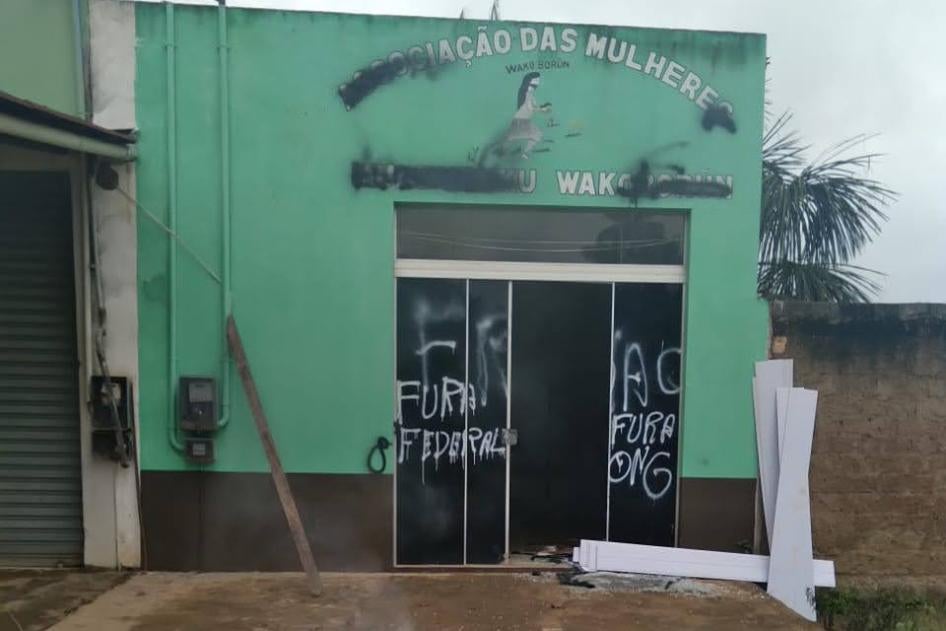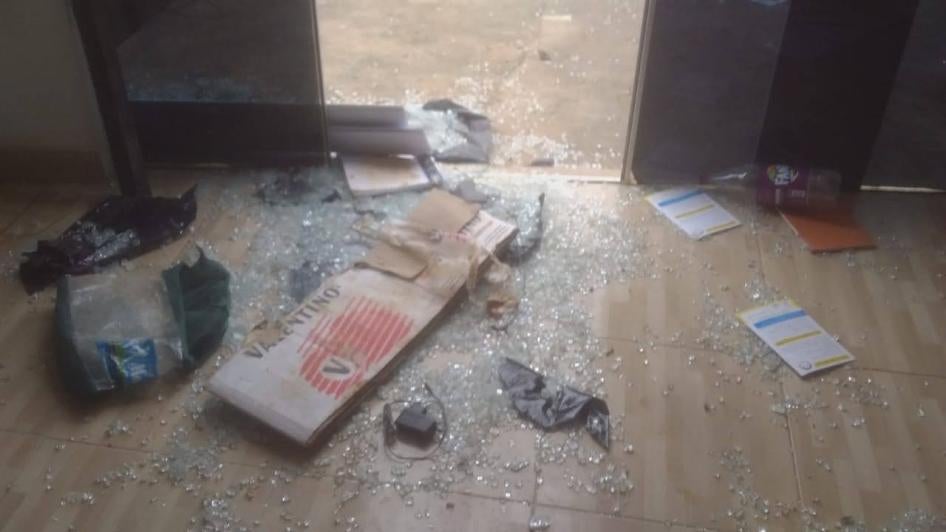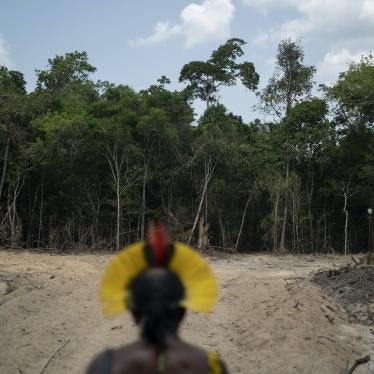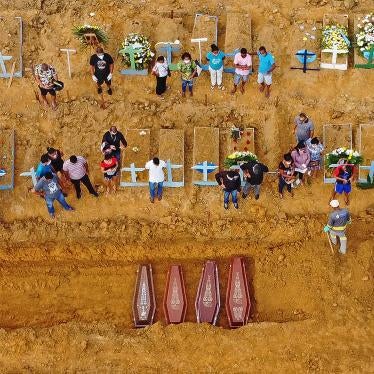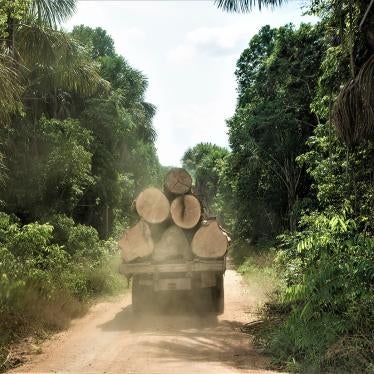(São Paulo, April 12, 2021) – Brazilian federal authorities should immediately remove miners who have unlawfully entered the Munduruku Indigenous territory in the Amazon rainforest, Human Rights Watch said today.
Munduruku Indigenous people in the Tapajós basin – an epicenter of illegal gold mining in the Amazon rainforest – in southwestern Pará state have reported increasing encroachments upon their lands by armed “wildcat” miners known as “garimpeiros” since March 14, 2021. The Federal Prosecutor’s Office has warned of a potential for violence between local residents and the miners and urged the deployment of the federal police and other authorities to remove the trespassers. But the government has yet to act. The tension has escalated in recent weeks after a group of miners brought equipment to the area.
“Indigenous people in the Munduruku territory are facing land invasions, environmental destruction, and serious threats by criminal groups involved in illegal mining,” said Maria Laura Canineu, Brazil director at Human Rights Watch. “Unless the government takes decisive action to enforce the law and expel the invaders, the situation will only get more dangerous.”
Illegal mining causes significant deforestation in the Brazilian Amazon and has been linked to dangerous levels of mercury poisoning, from mercury widely used to process the gold, in several Munduruku communities along the Tapajós basin. Indigenous people also fear that miners could spread the Covid-19 virus in their communities.
In a public statement on March 16, the Federal Prosecutor’s Office reported that a helicopter appeared to have escorted the miners and their equipment, suggesting the invasion is “an orchestrated action” by an organized crime group. The office also reported that the miners may be coordinating the invasion with a “small group” of Indigenous people who support the mining.
Members of Munduruku communities who oppose the mining and have reported the invasions to the authorities say they have faced threats and intimidation. On March 19, armed men reportedly prevented a group of Munduruku Indigenous people from disembarking from their boats in an area within their territory. On March 25, in the Jacareacanga municipality, miners and their supporters forced their way into a building that houses the Wakoborun Women’s Association and other community organizations that have opposed the mining. The attackers destroyed furniture and equipment and set fire to documents, Indigenous leaders reported.
The Munduruku Indigenous Territory has long suffered from encroachments by miners, but the situation has “clearly worsened” under the Bolsonaro administration and reflected a broader upsurge in illegal mining in the region, a federal prosecutor told Human Rights Watch.
Illegal mining activities and the associated deforestation have also threatened the health and food sources of the peoples in the Tapajós River basin. A recent study by Fiocruz, a research institution affiliated to Brazil’s Health Ministry, and the World Wildlife Fund (WWF) found that mercury, a toxic substance, has contaminated river fish that Munduruku communities in the Sawré Muybu territory rely on for their livelihoods. In three of its villages, 58 percent of residents tested for the study had unsafe levels of mercury in their blood. Mercury poisoning can cause lifelong brain damage and other serious, irreversible health conditions.
Federal prosecutors have opened an investigation of the failure of federal authorities to curb illegal mining activities in Munduruku territories in southwestern Pará. In 2017, federal prosecutors said that Brazil’s environmental agencies – the Brazilian Institute of the Environment and Renewable Natural Resources (IBAMA) and the Chico Mendes Institute for the Conservation of Biodiversity (ICMBio) – should conduct periodic enforcement operations against illegal mining in the region, and petitioned the federal court in 2018 to require enforcement action.
These measures produced just a single large operation by the environmental agencies over the course of two years, in May 2018, a federal prosecutor told Human Rights Watch.
In June 2020, federal prosecutors again said that federal agencies should curb mining within Munduruku lands and urged the Federal Police to act to remove the trespassers. Two months later, IBAMA began an operation in the Munduruku and Sai Cinza territories, but the Defense Ministry halted the operation to “reevaluate” it after Environment Minister Ricardo Salles met with an Indigenous group favoring mining activities. The next day, the Defense Ministry also barred aircraft used by IBAMA from taking off from a military airbase in Pará. The operation was never resumed.
In December 2020, the Inter-American Commission on Human Rights (IACHR) urged Brazil to protect the right to health, life, and personal integrity of the Munduruku Indigenous people. The commission expressed concern that illegal miners and other trespassers could spread Covid-19 in communities lacking sufficient access to health services. In response, the Bolsonaro administration claimed it was protecting the communities and said the Ministry of Justice and Public Security was developing plans to remove trespassers from Indigenous lands.
“There may be plans in the works, but that shouldn’t stop them from acting now to contain the scenario of imminent violence that we are seeing,” the federal prosecutor told Human Rights Watch.
The Bolsonaro administration has weakened the agencies tasked with protecting the environment, effectively emboldening criminal networks involved in illegal logging and mining, among others, in the Amazon.
The suspension of the 2020 operation was indicative of a breakdown in broader cooperation between federal prosecutors and environmental agencies since President Bolsonaro took office. “We used to dialogue directly with federal agencies, but there is no longer a good environment for such interaction with IBAMA’s new agenda,” the federal prosecutor said.
In the absence of adequate law enforcement, Munduruku Indigenous people are left to patrol and protect their lands by themselves and report invasions to authorities, at great personal risk.
“We demand that federal bodies comply with their constitutional duties immediately,” the Munduruku Ipereg Ayu Movement, a group of Munduruku forest defenders, said on March 21. “If something happens to our people, we blame the Brazilian state, which does not act even after several reports of invasions and destruction of the territory in the middle of a pandemic.”
Under Bolsonaro, deforestation in Indigenous lands throughout the Amazon is higher than at any time over the past decade, according to official data, and invasions increased by 135 percent in his first year, the Indigenist Missionary Council (CIMI) reported. Other Indigenous communities in the Amazon struggling with incursions by miners include the Yanomami and Ye’kwana in Roraima state.
President Bolsonaro has signaled his aversion to protecting Indigenous lands. As a candidate, he vowed not to designate “one more centimeter” of land as Indigenous territory. His administration has halted the demarcation of Indigenous territories – there are 237 pending requests – leaving Indigenous communities even more vulnerable to encroachments, deforestation, and violence. The Munduruku territory is already demarcated.
In 2020, Bolsonaro introduced a draft bill in Congress to allow mining and other commercial activities in Indigenous territories. The bill is pending in Congress and is listed as one of Bolsonaro’s priorities.
“Previous administrations have also failed to protect the Munduruku territory from illegal mining,” Canineu said. “The difference now is that the federal government is run by an administration that has actively undermined environmental enforcement and the protection of Brazil’s Indigenous peoples’ lands.”
